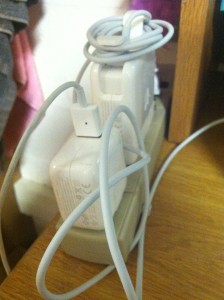Putting the Energy-Consuming Monster to Rest

As I sit here and write this blog, my computer is plugged into the charger, my IPhone sits sucking up energy through its own charger, and not only is my overhead light on, but my desk light shines above my workspace. I guess it’s no surprise that I need to cut back my home energy use.
The past week I have witnessed myself leaving three different light sources on and running, leaving the TV on just for background noise, constantly having my computer, IPad, and IPhone on their chargers, and leaving all chargers and electronics plugged into outlets, even if they were not in use. Though it now seems like ridiculous behavior, prior to researching my ecological and carbon footprints, this was the norm. I didn’t think twice about it.
By watching myself this past week, I’ve realized that I do these things because they are habits of mine. I don’t think about turning on lights or plugging in my electronics–I just do it. Now that I realize why I’m being such an energy-consuming monster, I can change my behavior by breaking these habits.
In a study entitled “Reducing Carbon-Based Energy Consumption through Changes in Household Behavior,” I discovered a surprising fact. The study determined that a conservative estimate suggests that household decisions are responsible for greater than 30% of U.S. CO2 emissions (Deitz, 2013)! Learning that statistic made me realize how big of deal “just” leaving all my chargers and lights on really is. The study also says that, “Efforts to encourage increased energy efficiency should begin with a careful analysis of reasonably achievable reductions,” (Deitz, 2013). I found this incredibly relevant to my behavior change, because when I was decided what to pick, I made sure to choose a behavior I was really capable of altering. If I said that I was going to completely stop using my cellphone, I know I wouldn’t actually be able to do that (my Twitter followers would miss me too much…) That is why I decided to pick something small enough that I knew I could really accomplish. The study also researches “behavior plasticity” by considering a number of factors concerning household decisions (Deitz, 2013). One of these factors asks if the change requires a breaking of old habits and performing behaviors that are new and different (Deitz, 2013). This is the exact situation I described myself in earlier. This isn’t a huge, monumental change, but it will take a breaking of habit and a replacement of a new, unfamiliar behavior (what is “unplugging…?”)
Deitz, T., Stern, P. C., & Weber, E. U. (2013). Reducing carbon-based energy consumption through changes in household behavior. Daedalus, 142(1), 78-89. Retrieved from http://0-www.mitpressjournals.org.libcat.lafayette.edu/doi/pdf/10.1162/DAED_a_00186
Leave a Reply